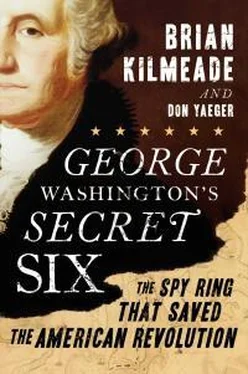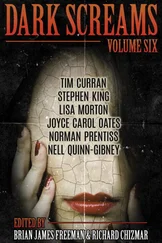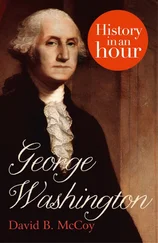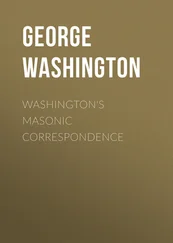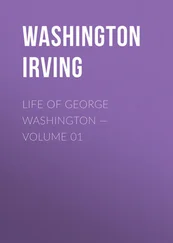BETRAYAL AT JAMAICA PASS
The battle was swift and devastating.
Tipped off by someone—whether a spy within Washington’s own ranks or a disgruntled Loyalist in New York was unclear—the British learned that Jamaica Pass was guarded by only five men and set out in that direction.
William Howard Jr., a young Patriot who ran a tavern with his father near Jamaica Pass, Long Island, woke about two hours after midnight on the morning of August 27 to a British soldier standing beside his bed. The soldier ordered him to get up, dress, and go downstairs. He quickly obeyed and found his father cornered by three redcoats pointing their muskets with fixed bayonets at him. A glance out the window revealed that a whole fighting unit stood at the ready upon the grounds.
General Howe waited for the two men in the barroom. Sipping a glass of commandeered liquor, he attempted, rather absurdly, to make small talk with the terrified father and son before finally getting to the point. “I must have some one of you to show me over the Rockaway Path around the pass,” he remarked, setting down his empty glass.
“We belong to the other side, General,” the father replied, “and can’t serve you against our duty.”
Howe’s reply was kind but curt. “That is all very well; stick to your country or stick to your principles when you are free to do so. But tonight, Howard, you are my prisoner, and must guide my men over the hill.”
The senior Howard began to protest, but Howe cut him off: “You have no alternative. If you refuse you will be shot.”
Shaking, and unaware of just how damaging their compliance would prove, the Howards directed General Howe safely up the winding footpath. Behind them marched ten thousand men through the vulnerable pass, arriving at the other side in time to effectively flank the Patriot general Nathan Woodhull and his men, who were occupied with the frontal assault waged against their defenses in Manhattan when daylight came. As the battle continued throughout the day, Washington recognized his miscalculation that the full contingent of British troops would storm Manhattan—the redcoats were also bringing heavy force to bear on Brooklyn. Washington shifted more men and matériel to Brooklyn, but it was too late for the Americans to recover and hold their ground. By day’s end, Brooklyn and the surrounding area was largely in British hands, with the retreating Patriots trapped in Brooklyn Heights. Manhattan alone still held, but Washington was sure it was only a matter of time until the British overtook it, too.
Washington’s troops were decimated. All told, the Americans had lost more than 300 men that day, in addition to nearly 700 wounded and 1,000 captured. The British (and their German mercenaries, the Hessians) had lost a mere 64 men, with 31 reported as missing, and 293 wounded.
A MIRACLE IN THE MIST
Things could not have gone more badly for the Continental Army, and both sides knew it. And it wasn’t over, though the cannons had ceased to fire. The fighting had taken Washington across the East River, but now he was essentially trapped in Brooklyn Heights, surrounded by the British and with no way to escape. If his troops pursued a retreat by land, they would walk directly into the British camps and be either shot on sight or captured and hanged for treason. If they took to the water to escape to Patriot-held Manhattan, they would be sitting ducks as the British fired cannonballs into the rowboats. Then again, that was likely too messy—the British prided themselves on their extreme pragmatism. No, they would probably take the more gentlemanly route of allowing their marksmen to pick off the retreating Americans one by one.
Just like that, the Revolution was all but over. Washington must have reeled at the turn of events. Maybe it was inevitable; after all, who were the colonists to think they had a chance against the mighty king of England and an empire that encircled the globe? Washington had been entrusted with the hopes, dreams, lives, and futures of every American Patriot—and he was standing on the brink of failure.
The Americans needed to get out and get out fast. If the bedraggled and punch-drunk Patriot soldiers could somehow manage to escape, they could regroup with the friendly troops waiting in American-controlled territory. It was a big “if.”
“We have no other options?” Washington asked the officers assembled with him at his makeshift headquarters in Brooklyn Heights.
There was a pause as each man looked around the table with raised eyebrows, as if asking his comrades, “Have you got any miracles to spare?”
But Washington already knew the answer. Unless he could somehow ferry nine thousand men undetected across New York Harbor, currently patrolled by the might of the Royal Navy, he would be forced to surrender or ask his men to die in a siege from which there was no foreseeable escape. And with the betrayal regarding their vulnerability at Jamaica Pass, and no individual able to convey intelligence from the British positions, there was no way to anticipate what the redcoats’ next move might be.
Washington was near despair, but he was also a man of faith. No one knows what prayers passed his lips during those tense two days as he faced almost certain defeat. As night fell on the evening of August 29, he peered over New York Harbor and knew he had no other hope. Escape by water was the only chance—and even that would take a miracle. Ordering a hasty retreat, Washington oversaw the efforts to ferry his army and their possessions—every man, beast, cannon, and rifle—safely across the water under the cover of darkness. To his relief, the British sentinels failed to spot the shadowy silhouettes of the escaping soldiers. But as the sky began to lighten, there were still men to move—and it was then that Washington’s prayers proved effective. A thick fog began to roll in, like the benevolent breath of God, providing cover and protection until every last soldier and piece of equipment reached safety on the other side. Washington’s boots were the last to leave the Brooklyn Heights side of the harbor, and the last to alight in Manhattan, which the Patriots still held.
By the time the fog had fully lifted and the British realized what had happened, the Americans were already out of the reach of British cannons. They were down, but not out—though just barely. Washington knew it would be only a matter of days before General Howe ordered an attack on the remaining American fortifications in Manhattan, which would surely fall.
Moving north to Connecticut, Washington and his men rejoiced in their escape, though the all-but-complete loss of New York was a serious blow. Gone was the optimism created by the Boston victory. Troop morale was low. Backed into a corner, Washington now realized what every small child comes to recognize when faced with the brute strength of a school-yard bully: He could not defeat his foe with manpower, arms, or any other show of force. He would have to beat the British in a battle of wits.
CHAPTER 2 The Need for a Spy Ring
As if the loss of most of New York weren’t bad enough, Washington’s autumn was about to get worse. While the defeat at the Battle of Brooklyn had been a blow, the retreat had gone better than planned. Washington’s next endeavor would not be so fortunate, ending instead in disaster.
The few American troops still holding Manhattan were hanging on by a thread, and Washington was desperate to strengthen their position. To do so, he would need a spy to collect information on British plans. Espionage was not a new activity to Washington. Having fought in the French and Indian War and served as a spy himself, he understood the roots of the present conflict—an insight that would frame his use of an intelligence network in the Revolution.
Читать дальше
